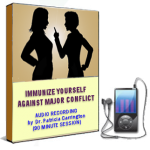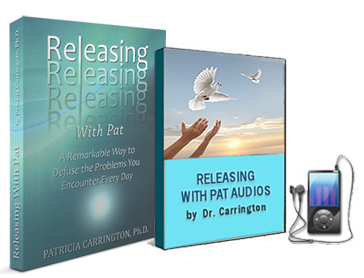Home » EFT Articles » EFT Success Tactics » The EFT 1% Solution: Applying it to the Act of Forgiveness
The EFT 1% Solution: Applying it to the Act of Forgiveness
By
Andy Hunt, author of the book, "Getting Out Of Your Own Way – Finding and Releasing Unconscious Blocks with EFT," is an EFT & NLP Trainer and Practitioner living in the North East of England. Andy's EFT method of the 1% solution applies to actions we want to change and it can work brilliantly for that purpose. My use of a 1% solution, as taught in my book, Releasing with Pat, applies to emotions and attitudes that we want to change. Both these applications of the 1% principal can be extremely helpful. In both instances we are speaking about using “gradualness“ when approaching change.
Here is one very useful way you can apply my version of the 1% solution to a common problem that many of us face, perhaps all of us at one time or other. This is the problem of how to genuinely forgive someone else.
I cannot tell you how often people have told me that they simply cannot conceive of forgiving some other person for destructive acts that person has done –– even if they have tried using EFT for this problem it did not work. They feel that to tap in order to do this would be paying mere lip service to the concept of "forgiveness", it would not come from their heart.
The problem with forgiveness
I agree that the act of "forgiveness" is all too often only lip service and is all too often entered into by a person who feels they must "forgive" someone (or fate), perhaps for religious or ethical reasons. To truly forgive however, especially when one has deep resentment, fear or anger about a "wrong" that has been done, is one of the most difficult and "non-intuitive" things that we are ever asked to do.
The reason for this is that the act of forgiving is actually not an act at all in the ordinary sense of that word. When it happens it does so naturally as a result of letting go of resentment against the other party, and letting go of the desire to punish.
Webster's New International Dictionary and the Oxford Dictionary of the English Language, both define the verb "to forgive" as "to give up resentment against or the desire to punish; to stop being angry with; to pardon." It is quite clear that their definitions of forgiveness refer to the result of letting go of anger or resentment or a desire for revenge. Forgiveness, then, is basically an absence of these negative emotions, not an act in itself.
This makes for difficulty, however, when we attempt to use EFT to "tap in" forgiveness because it is much easier for people to hold on to something than it is to let go of it. Ask someone, for example, to place a book on a table, and more than likely (if they have no special reason for not doing so) they will find it easy to comply with your request because they are being asked to do a simple act.
However, ask that same person to "let go" of a book they might already be holding and they may well resist that request, or at least hesitate to carry it out until they give considerable thought to the consequences. They will probably consider possible outcomes that come to mind and will try to decide whether it is safe and advantageous for them to let go of the book (perhaps it will fall upon the floor and get damaged? Maybe they will be "pushed around" or otherwise manipulated by you if they comply with this request? etc.). The result is that this person may be reluctant to let go of the book.
Our instinctive need to hold on to what we have
I am reminded of the way newborn infants display an amazingly powerful grasp reflex; they can hold on with enormous strength to a finger or object within reach and not let go of it for a long time –– sometimes their fingers will have to be pried loose from the object. This grasp reflex may well be due to some inherited instinct that helped newborn humans to survive when we were tree dwelling primates. It is likely that the newborn had to be able to grasp onto their mother or onto a tree branch to avoid a disastrous fall.
Whatever the reason, however, the fact is that it is usually easier for us to hold on to something then it is to let go of that same thing, and because of our use of language, we have a strong tendency to hold on to remembered wrongs, and seemingly cannot pry ourselves loose from thoughts about "justice" and "punishment" for a wrong. We cling to such thoughts tenaciously for long periods of time, sometimes for a lifetime, and it is not surprising that we hear stories of vendettas that carry on from generation to generation in certain countries, with a revenge motive controlling the lives of the people caught in it.
How then can we bring about "forgiveness", which basically involves a letting go of resentment and giving up of the wish for revenge? It is not easy even if we EFT.
Forgiveness is actually the result of an act – not an act in itself
Actually, forgiveness is something that happens automatically and naturally when resentment, anger, revenge, and a desire to punish have been relinquished, I am going to suggest a way in which EFT can be used to lessen or eliminate resentment and the punishment motive, thereby creating the natural state of forgiveness which is, in fact, basically an absence of the need for revenge.
Since there is much reluctance in people to letting go of resentment and the need for retribution, I have found it far more productive to approach this task in an indirect manner, to do it little by little, in what are called "baby steps".
One way I have found is to be extremely effective is to break up the revenge motive into tiny manageable pieces. I call this the "Divide And Conquer" tactic. Here's how it works:
Suppose that one person has been deeply hurt by another person in the past. If you ask

|
Person 1 to "forgive" that other person, it usually seems impossible at first. Even if you ask her or him to "let go" of any resentment they have toward the other person, it still tends to feel impossible. How, they reason, can a person just let go of resentment at being deeply hurt if they’ve been deeply hurt?
A way to get around this trap, one which I find to be extremely effective, is to BREAK UP the "letting go" process into tiny chunks, so that you first prove to yourself that your conviction (i.e. that it's impossible to let go of your resentment) is simply not true, that resentment can be let go of in little pieces –– which of course paves the way for a much greater letting go to come.
The way to do that is this:
When you formulate your EFT statement, end the statement with a Choice to "let go of only 1%" of your resentment" (you can even add the phrase, "and keep all the rest of it" if you wish, that can be very reassuring). Here is how this might go.
You would create an EFT statement such as:
"Even though I'm outraged at what ________ did, I choose to let go of 1% of my (anger, resentment, etc.) against ________ , and keep the rest."
If you use the "1%" solution" this way, you will probably find yourself able to let go of a ridiculously small portion of your resentment. After all, it is not difficult to ask yourself to give up "just 1%" of it, because you are still allowed to retain most of your righteous anger!
The secret ingredient in the 1% solution
Here is the secret–– if you are able genuinely to let go of 1% of your resentment (your anger and desire to punish etc.) then you will find your self in a very different state of mind than before.
As I wrote about this in my book Releasing With Pat: A little "release" is always a big "release."
By using this simple maneuver, you will have abandoned a deeply entrenched belief, which is your certainty that you cannot under any circumstances let go of your resentment!
I have many times seen this simple strategy (letting go of 1% of the resentment) result in a person's ability to suddenly be able to entertain the possibility of letting go of all of their resentment. Once relinquishing a desire for revenge is seen as being possible, the road has been cleared for you to release your entire resentment/punishment motive. When you let go of your tenacious hold on the conviction that "justice must be done at any cost", and punishment must be meted out for you to be at rest, you will have lifted a tremendous emotional burden from yourself and be able to move ahead constructively with your life.
You may decide that you don't want to see that particular person again or don't want
 Immunize Yourself Against Major Conflict Immunize Yourself Against Major Conflict |
to put yourself in that kind of situation again, but you are now free to choose what is really best for you. This is because the emotional charge has been removed from the situation. Now you will have "forgiven" that person in the true sense of that word. The revenge motive will have evaporated, and because unforgiveness depends on that motive to keep it alive, it too will have melted away. You will have "forgiven" this person or circumstance or fate, and can go on from there to build a new relationship or another better relationship, or whatever you desire.
I strongly recommend that you use this EFT "1 percent solution" when the need to forgive is resistant to any other approach. It can often be all that you need to do.
 “The releasing technique is one of the most powerful self-help techniques available for conquering stress and increasing personal effectiveness…"
“The releasing technique is one of the most powerful self-help techniques available for conquering stress and increasing personal effectiveness…"



